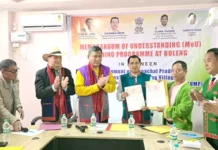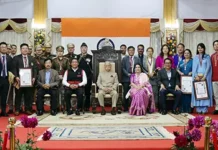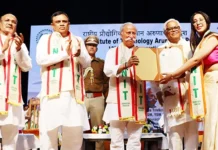NEW DELHI, 23 Nov: The Supreme Court is scheduled to hear on Monday a plea filed by Sonam Wangchuk’s wife, which termed the climate activist’s detention under the stringent National Security Act (NSA) an illegal and an arbitrary exercise violating his fundamental rights.
The top court had on 29 October sought response of the Centre and the Ladakh administration on the amended plea of Wangchuk’s wife Gitanjali J Angmo.
As per the apex court’s cause list of 24 November, the plea is slated to come up for hearing before a bench of Justices Aravind Kumar and NV Anjaria.
Wangchuk was detained under the NSA on 26 September, two days after violent protests demanding statehood and 6th Schedule status for Ladakh left four people dead and 90 injured in the union territory. The government had accused him of inciting the violence.
The amended plea has said, “The detention order is founded upon stale FIRs, vague imputations, and speculative assertions, lacks any live or proximate connection to the purported grounds of detention and is thus devoid of any legal or factual justification.”
“Such arbitrary exercise of preventive powers amounts to a gross abuse of authority, striking at the core of constitutional liberties and due process, rendering the detention order liable to be vitiated by this court,” it said.
The plea said it is wholly preposterous that after over three decades of being recognised at the state, national, and international levels for his contributions to grassroots education, innovation, and environmental conservation in Ladakh and across India, Wangchuk would suddenly be targeted.
“Merely two months before the elections and the final rounds of dialogue between ABL (Apex Body of Leh), KDA (Kargil Democratic Alliance), and the Ministry of Home Affairs, he was served with notices for land lease cancellation, FCRA cancellation, initiation of a CBI investigation, and summons from the Income Tax Department,” it said.
The plea claimed that these coordinated actions, taken in close temporal proximity, make it prima facie evident that the order of detention is not based on genuine concerns of public order or security but is instead a calculated attempt to silence a respected citizen exercising his democratic and constitutional right to dissent.
The plea said that the unfortunate events of violence in Leh on 24 September cannot be attributed to the actions or statements of Wangchuk in any manner.
It said Wangchuk himself condemned the violence through his social media handles and categorically stated that violence would lead to the failure of Ladakh’s “tapasya” and peaceful pursuit of five years and stated that “it is the saddest day of his life.”
It further stated that complete grounds of detention were only supplied to Wangchuk after a flagrant delay of 28 days, which is in clear violation of the statutory timeline prescribed under section 8 of the NSA.
The plea said under Section 8 of the NSA the detaining authority shall as soon as may be, but ordinarily not later than five days and, in exceptional circumstances and for reasons to be recorded in writing, not later than 10 days, communicate to the detenu the complete grounds of detention.
The NSA empowers the Centre and states to detain individuals to prevent them from acting in a manner “prejudicial to the defence of India.” The maximum detention period is 12 months, though it can be revoked earlier. (PTI)



